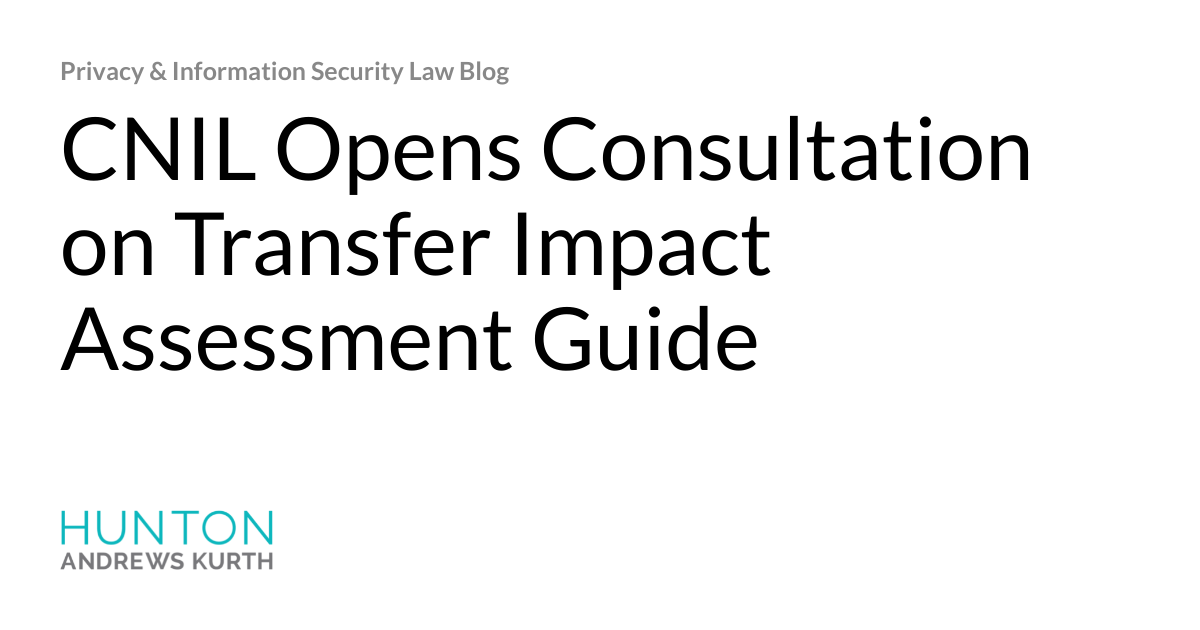Mobile App Privacy: A Guide To CNIL Compliance

Table of Contents
Understanding CNIL Regulations and GDPR Applicability
The CNIL is the French data protection authority responsible for enforcing data privacy laws within France. Its role is intrinsically linked to the General Data Protection Regulation (GDPR), a comprehensive EU regulation that sets a high standard for personal data protection across all member states. Understanding both is crucial for CNIL compliance.
- The CNIL's authority over mobile apps: The CNIL has the power to oversee and regulate any mobile application processing personal data of individuals located in France, regardless of where the app is developed or hosted.
- GDPR's applicability to apps: The GDPR applies to any app that targets or collects data from individuals residing within the European Union, including those in France. Even if your app's primary market isn't the EU, processing EU resident data triggers GDPR compliance obligations.
- Key GDPR principles relevant to mobile apps: The GDPR outlines several core principles that are directly applicable to mobile app development. These include:
- Lawfulness, fairness, and transparency: Data processing must have a legal basis, be fair to users, and be transparent about how data is used.
- Purpose limitation: Data should only be collected for specified, explicit, and legitimate purposes.
- Data minimization: Only collect the minimum amount of personal data necessary.
- Accuracy: Data should be accurate and kept up to date.
- Storage limitation: Data should only be kept for as long as necessary.
- Integrity and confidentiality: Data should be processed securely and protected against unauthorized access.
- Accountability: Organizations are responsible for demonstrating compliance with the GDPR.
These principles necessitate a proactive approach to data protection throughout the entire mobile app development lifecycle. For example, an app requesting location data for navigation must only collect the minimum necessary location information and clearly state this in its privacy policy.
Data Minimization and Purpose Limitation in Mobile App Design
Data minimization and purpose limitation are cornerstones of CNIL compliance. Collecting only necessary data and specifying its purpose clearly are vital for building user trust and complying with regulations.
- Best practices for minimizing data collection:
- Only request essential permissions. Avoid asking for broad permissions if only specific functionalities require them.
- Use privacy-enhancing technologies like differential privacy where feasible.
- Implement granular permission controls, allowing users to selectively grant access to specific features.
- Clearly defining data usage: Your privacy policy and user agreement must clearly and concisely explain what data your app collects, why it's collected, and how it will be used. Avoid ambiguous language.
- Implementing data encryption and secure storage: Protect data in transit using HTTPS and at rest using encryption algorithms. Ensure your data storage solutions comply with CNIL security standards.
- Regularly reviewing collected data: Periodically review the data your app collects and delete any information no longer needed. This is key for demonstrating compliance with data minimization principles.
For instance, a fitness app should only request access to necessary health data, such as step count and heart rate, if these are essential to its core functionality. Requesting access to contacts or location history without a clear justification would be a violation of data minimization principles.
Transparency and User Consent in Mobile App Development
Transparency and user consent are crucial for CNIL compliance. You must obtain explicit consent from users before processing their personal data, and you must provide clear and accessible information about your data collection practices.
- Obtaining informed consent: Consent must be freely given, specific, informed, and unambiguous. Avoid pre-selected checkboxes or confusing language. Use plain language, avoiding legal jargon.
- Implementing consent management: Provide users with clear controls to manage their consent preferences, such as toggles to enable or disable data collection for specific features.
- Transparent privacy policies: Your privacy policy should be easily accessible within the app and on your website. Use clear, concise language, avoiding technical terms where possible.
- User rights: Inform users about their rights under the GDPR, including the right to access, rectify, and erase their data. Provide mechanisms for users to exercise these rights.
A well-written privacy policy will clearly state what data is collected, why it is needed, who it is shared with (if applicable), and how users can access and control their data. Avoid generic templates; personalize it to reflect your app's specific data handling practices.
Security Measures for Protecting User Data in Mobile Apps
Protecting user data from breaches and unauthorized access is critical for CNIL compliance. Robust security measures are essential to maintain user trust and avoid penalties.
- Data encryption: Encrypt data both in transit (using HTTPS) and at rest (using appropriate encryption algorithms).
- Secure coding practices: Follow secure coding guidelines to prevent vulnerabilities in your app's code. Regularly update your app's libraries and frameworks.
- Security audits and penetration testing: Conduct regular security audits and penetration testing to identify and address vulnerabilities.
- Authentication mechanisms: Implement strong authentication methods, such as multi-factor authentication, to protect user accounts.
- Data breach reporting: Have a plan in place to report data breaches to the CNIL promptly and transparently in the event of a security incident.
Implementing these security measures demonstrates your commitment to protecting user data and strengthens your compliance posture. Regular updates and proactive security monitoring are essential for long-term protection.
CNIL Audits and Compliance Procedures
The CNIL may conduct audits to assess your compliance with data protection regulations. Understanding their process and preparing for potential audits are crucial.
- CNIL expectations: The CNIL expects transparency, accountability, and a proactive approach to data protection. They will review your privacy policy, data processing activities, security measures, and complaint handling procedures.
- Preparing for audits: Maintain thorough documentation of your data processing activities, security measures, and compliance efforts. Establish a data protection officer (DPO) if required.
- Data Protection Impact Assessment (DPIA): Conduct a DPIA for high-risk processing activities to identify and mitigate potential risks to individuals' rights and freedoms.
- Responding to CNIL requests: Respond promptly and fully to any requests for information from the CNIL.
Proactive compliance measures will significantly reduce the risk of non-compliance and associated penalties. Understanding the CNIL’s expectations and implementing a robust compliance program are crucial for long-term success.
Conclusion
Achieving CNIL compliance for your mobile app is crucial for maintaining user trust, protecting your reputation, and avoiding significant financial penalties. By understanding the core principles of GDPR and the CNIL's specific guidelines, you can develop a secure and privacy-respecting application. Remember to prioritize data minimization, transparency, informed consent, and robust security measures throughout the development lifecycle. Regularly review your privacy practices and stay updated on evolving regulations to ensure ongoing CNIL compliance. Don't hesitate to seek professional guidance to navigate the complexities of mobile app privacy and ensure your application meets all necessary standards for CNIL compliance.

Featured Posts
-
 Amanda Owens Ambitious Plans After Split From Ex Husband
Apr 30, 2025
Amanda Owens Ambitious Plans After Split From Ex Husband
Apr 30, 2025 -
 Addressing Concerns At Parkland A Measured Approach To Board Change
Apr 30, 2025
Addressing Concerns At Parkland A Measured Approach To Board Change
Apr 30, 2025 -
 Trumps First Weeks Congressional Address And National Outlook
Apr 30, 2025
Trumps First Weeks Congressional Address And National Outlook
Apr 30, 2025 -
 Noa Argamani Addresses Hostage Situation At Time Gala A Call For Action
Apr 30, 2025
Noa Argamani Addresses Hostage Situation At Time Gala A Call For Action
Apr 30, 2025 -
 Disney Cruise Line Announces Two Ships For Alaska In Summer 2026
Apr 30, 2025
Disney Cruise Line Announces Two Ships For Alaska In Summer 2026
Apr 30, 2025
